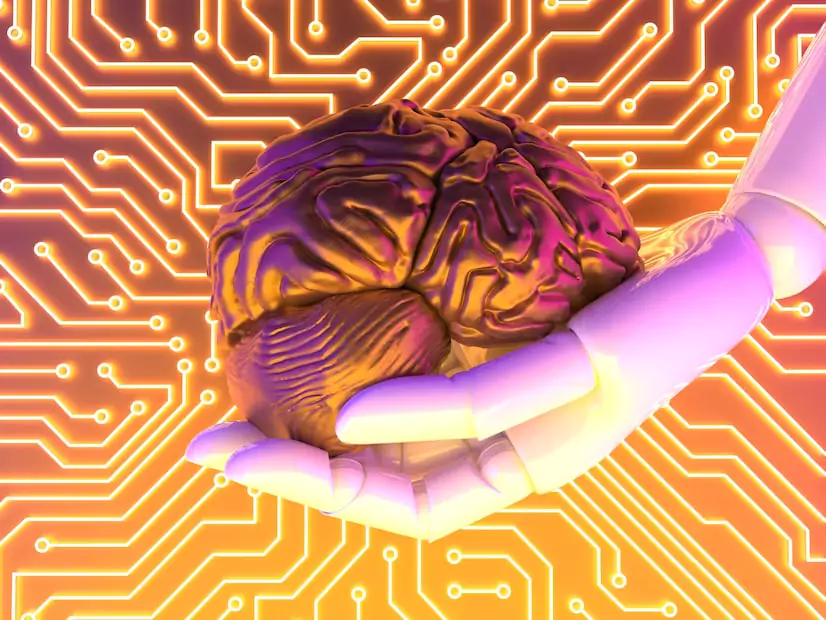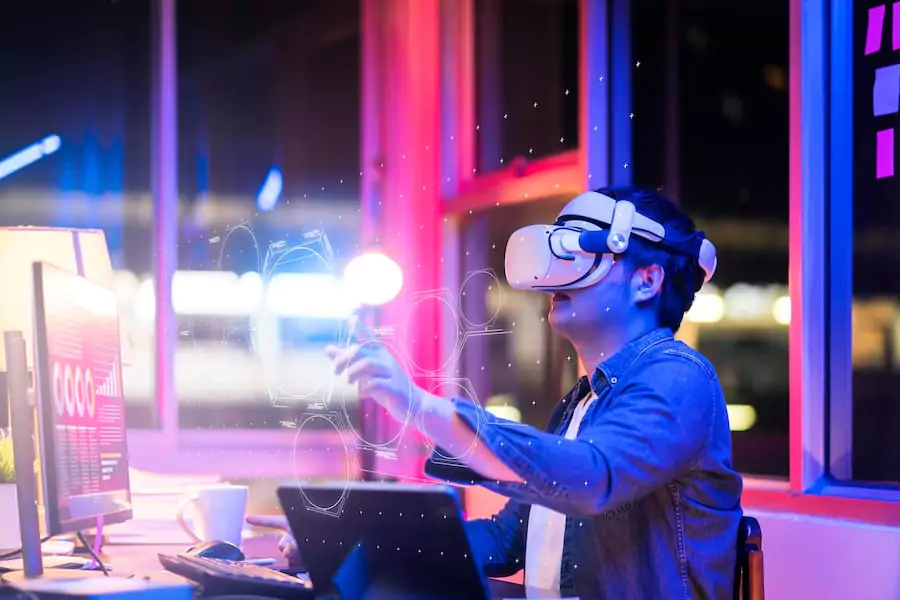The narrative surrounding Artificial Intelligence (AI) often paints a grim picture of job loss and economic upheaval. Experts, however, are highlighting roles that AI is unlikely to take over, at least in the near term. Does this mean some jobs are truly immune to the AI revolution?

✅ AI Essay Writer ✅ AI Detector ✅ Plagchecker ✅ Paraphraser
✅ Summarizer ✅ Citation Generator

Key Takeaways:
- Some jobs need human qualities. Jobs with creativity and emotional intelligence are safer from AI.
- AI doesn’t replace all jobs. It changes how we work. We need to learn new skills to work with AI.
- AI can threaten high-skilled jobs too. Learning to adapt and use unique human skills is important.
The Future of Work: AI and Human Jobs
Martin Ford, author of “Rule of the Robots: How Artificial Intelligence Will Transform Everything,” paints a stark picture. A recent report by Goldman Sachs predicts that AI could replace a quarter of all human work, potentially causing 300 million job losses across the European Union and the US. The implications for individuals and the economy are significant.
Yet, Ford emphasizes that not all jobs are at risk. Jobs that involve distinctly human qualities, such as emotional intelligence and creative thinking, may weather the storm of AI automation. But which careers are these exactly?
Creative Jobs: AI’s Achilles Heel?
According to Ford, the first type of roles that AI won’t take yet are genuinely creative jobs. While AI can master aesthetics, there are realms of creativity where human beings will continue to be indispensable. “In science, and medicine and law … people whose job is coming up with a new legal strategy or business strategy… there’s going to continue to be a place there for human beings,” Ford argues.
Interpersonal Relationships
The second category of jobs computers aren’t taking anytime soon requires sophisticated interpersonal relationships. Occupations like nursing, business consulting, and investigative journalism need a deep understanding of people. Ford believes that “it’ll be a long time before AI has the ability to interact in the kinds of ways that really build relationships.”
A Safe Harbor from AI Automation
The third safe zone from AI automation is jobs that require significant mobility, dexterity, and problem-solving in unpredictable environments. Many trade jobs, such as electricians, plumbers, and welders, fall under this category. Automating such roles would need science fiction-level technology, Ford explains.
Even though these jobs are less threatened by AI, they are not entirely insulated. Most jobs will likely see aspects automated by AI, changing the nature of tasks performed by humans. According to Joanne Song McLaughlin, an associate professor of labor economics at the University of Buffalo, US, human jobs will become more focused on interpersonal skills.
AI, Human Skills, and the Evolution of Jobs
“AI will detect cancers way better than humans could…But I don’t think the doctor’s whole role will be replaced,” Mrs.McLaughlin says. People will still want human interaction, even if a robot does the technical job better.
Joanne McLaughlin encourages workers to think about the tasks within their jobs that could be replaced by AI, and then develop complementary skills. For instance, bank tellers used to focus on accurate money counting, a task now automated. Today, tellers focus more on connecting with customers and introducing new products. “The social skill has become more important,” she observes.

Interestingly, automation might not be a threat to jobs that fall under one category which is “low-paid”. Ford argues that white-collar jobs might be more at risk than we think. “In many cases, more educated workers are going to be threatened more than the least educated workers,” Ford warns.
Time for Panic or Adaptation?
Martin Ford states, “It could happen to a lot of people, potentially quite suddenly.” However, he stresses the need for human adaptability over panic. Emphasizing roles where AI can’t match human skills, he suggests a strategy of evolution over fear. Is panic justified? Ford suggests, “Adaptation, not fear, is the key to survival in the AI era.”
| Category | Job Examples | Reason for AI Resistance | Additional Information |
| Creative Jobs | Scientists, Lawyers, Business Strategists | These professions require original thought, which is something AI currently cannot replicate | AI may be able to analyze data or create content, but genuine innovation and new ideas remain a human domain |
| Jobs with Sophisticated Interpersonal Relationships | Nurses, Business Consultants, Investigative Journalists | These jobs necessitate a deep understanding of human emotion and the ability to build and maintain relationships | While AI can simulate responses, it cannot truly understand or reciprocate human emotions, making these roles more resistant to automation |
| High Mobility and Dexterity Jobs | Electricians, Plumbers, Welders | These roles often require mobility, manual dexterity, and the ability to solve problems in unpredictable environments | Automation of these roles would require highly sophisticated AI and robotic systems, comparable to science fiction robots |
| Jobs with Unpredictable Tasks | Hotel Cleaners, Uber Drivers | Tasks that vary greatly and are difficult to automate, such as cleaning different rooms or driving in unpredictable traffic | These types of jobs can be more resistant to automation, especially those involving physical tasks in changing environments |
This table provides a more detailed understanding of the types of jobs that AI may struggle to replace, at least for now, according to the experts.
AI vs Humans: Understanding the Limitations of Artificial Intelligence
Artificial Intelligence (AI) has undeniably revolutionized numerous facets of our lives. However, comparing AI to human cognition and capacity, there are limitations and distinctions that highlight the unique complexities of human intelligence.
The first aspect to consider is the element of creativity and spontaneity, both of which are fundamentally human traits. While AI can generate impressive results within defined parameters, it struggles to match the human ability to think outside the box, create novel concepts, and adapt to unforeseen circumstances. Humans possess the capacity for abstract thinking and can draw from diverse experiences, emotions, and perspectives to solve problems in innovative ways.
A related limitation of AI is its lack of emotional intelligence and nuanced understanding of social contexts. Humans can read subtle cues such as tone of voice, facial expressions, and body language to interpret meaning and adjust their responses accordingly. They can empathize, console, celebrate, or react to complex emotions in ways that AI, despite its advancements, still struggles to replicate.
Thirdly, AI’s learning process vastly differs from human learning. AI requires large volumes of data and significant processing time to train, and it often struggles with tasks that humans find intuitive, like understanding idioms or recognizing objects in different contexts. Humans, on the other hand, can learn from few examples, apply learned knowledge to different situations, and even learn from hypothetical scenarios.

Lastly, ethical judgment poses another significant challenge for AI. While AI can make decisions based on defined algorithms and parameters, it lacks the moral and ethical compass inherent in humans. AI cannot weigh moral implications, perceive injustice, or consider fairness in decision-making, which is crucial in many real-world scenarios.
It is essential, therefore, to recognize these limitations of AI when considering its applications. AI offers immense potential, but its role should be complementary, not substitutive, to human intelligence. The harmony between AI and human intelligence can lead to unprecedented advancements, with AI handling data-heavy tasks efficiently and humans contributing creativity, emotional intelligence, nuanced understanding, and ethical judgment. This symbiotic relationship could chart the course for a future where AI and human intelligence coexist and thrive.
Navigating the AI Landscape
In the face of growing AI implications, seeking roles in dynamic and shifting environments that include unpredictable tasks appears to be a good strategy to stave off job loss. The narrative around AI and job loss is complex and evolving, but one thing is clear: fostering human skills alongside AI technology will be vital in the jobs of the future. But how long can we stay one step ahead of the AI revolution? Only time will tell.
Related stories:
AI Disruption: ChatGPT Leads to $1 Billion Market Cap Loss for Pearson and Chegg
Software Engineering and AI: The Future of Collaboration and Innovation
Disappearing Art of Writing: How AI & ChatGPT Threaten the Future of Critical Thinking
Follow us on Reddit for more insights and updates.





Comments (0)
Welcome to A*Help comments!
We’re all about debate and discussion at A*Help.
We value the diverse opinions of users, so you may find points of view that you don’t agree with. And that’s cool. However, there are certain things we’re not OK with: attempts to manipulate our data in any way, for example, or the posting of discriminative, offensive, hateful, or disparaging material.